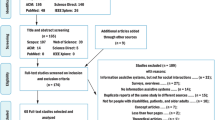Abstract
Teams engaging in assistive technology research should include expertise in the domain of disability itself, in addition to other areas of expertise that are more typical in human–computer interaction (HCI) research, such as computer science and psychology. However, unexpected problems can arise when HCI researchers do not adequately plan the involvement of domain experts in a research project. Although many research teams have included domain experts when designing assistive technologies, there has been little work published on how to best involve these experts in the research process. This paper is a first step towards filling that void. Based on the authors’ own experiences involving domain experts in research, as well as those documented in the literature, five types of domain experts and three broad roles that domain experts can play are identified, and five guidelines for their involvement are presented. This analysis will be useful to anyone in the assistive technology and universal accessibility communities, especially those who are in the early stages of conducting research in this area. It is intended to lay the foundation of best practices for involving domain experts in assistive technology research.

Similar content being viewed by others
References
Allen, M.: The Design and Field Evaluation of PhotoTalk: A Digital Image Communication Application for People who have Aphasia. Masters Thesis, University of British Columbia (2006)
Aphasia Project, http://www.cs.ubc.ca/projects/Aphasia/index.html, Accessed May 14, 2007
Boyd-Graber, J., Nikolova, S., Moffatt, K., Kin, K., Lee, J., Mackey, L., Tremaine, M., Klawe, M.: Participatory design with proxies: developing a desktop-PDA system to support people with aphasia. In: Proceedings of ACM CHI 2006, pp 151–160. ACM Press, New York (2006)
Cohene, T., Baecker, R., Marziali, E.: Designing interactive life story multimedia for a family affected by Alzheimer’s disease: a case study. In: Proceedings of CHI 2005, pp 1300–1303. ACM Press, New York (2005)
Cox, S., Lincoln, M., Tryggvason, J., Nakisa, M., Wells, M., Tutt, M., Abbott, S.: Tessa, a system to aid communication with deaf people. In: Proceedings of ASSETS 2002, pp 205–212. ACM Press, New York (2002)
Davies, R., Marcella, S., McGrenere, J., Purves, B.: The ethnographically informed participatory design of a PD application to support communication. In: Proceedings of ASSETS 2004, pp 153–160. ACM Press, New York (2004)
Dictionary.com, http://dictionary.reference.com, Accessed May 14, 2007
Fischer, G., Sullivan Jr, J.: Human-centered public transportation systems for persons with cognitive disabilities—challenges and insights for participatory design. In: Proceedings of PDC 2002, pp 194–198 (2002)
Jacko, J.A., Barreto, A.B., Marmet, G.J., Chu, J.Y.M., Bautsch, H.S., Scott, I.U., Rosa Jr, R.H.: Low vision: the role of visual acuity in the efficiency of cursor movement. In: Proceedings of ASSETS 2000, pp 1–8. ACM Press, New York (2000)
Kensing, F., Munk-Madsen, A.: PD: structure in the toolbox. Commun. ACM. 36, 78–85 (1993)
Leung, R.: Designing an Assistive Handheld Application for Adults with Limited Literacy Skills. MSc Thesis, University of New Brunswick (2006)
Leung, R., Lumsden, J., Fritz, J.: Accommodating special needs users in the evaluation of an M-learning application: a case study. In: Proceedings of IADIS international conference mobile learning, pp 177–184 (2006)
Lumsden, J., Leung, R., Fritz, J.: Designing a mobile transcriber application for adult literacy education: a case study. In: Proceedings of IADIS international conference mobile learning 2005, pp 16–23 (2005)
Moffatt, K.: Designing Technology For and With Special Populations: An Exploration of Participatory Design with People with Aphasia. MSc Thesis, University of British Columbia (2004)
Moffatt, K., McGrenere, J., Purves, B., Klawe, M.: The participatory design of a sound and image enhanced daily planner for people with aphasia. In: Proceedings of CHI 2004, pp 407–414. ACM Press, New York (2004)
Parr S., Byng S., Gilpin S., Ireland C.: Talking about Aphasia. Open University Press, Buckingham (1997)
Strothotte, T., Fritz, S., Michel, R., Raab, A., Petrie, H., Johnson, V., Reichert, L., Schalt, A.: Development of dialogue systems for a mobility aid for blind people: initial design and usability testing. In: Proceedings of ASSETS 1996, pp 139–144. ACM Press, New York (1996)
Tee, K., Moffatt, K., Findlater, L., MacGregor, E., McGrenere, J., Purves, B., Fels, S.S.: A visual recipe book for persons with language impairments. In: Proceedings of CHI 2005, pp 501–510. ACM Press, New York (2005)
Aphasia: The Facts, http://www.aphasia.org/naa_materials/aphasia_facts.html, Accessed May 14, 2007
Thorburn, L., Newhoff, M., Rubin, S.S.: Ability of subjects with aphasia to visually analyze written language, pantomime, and iconographic symbols. Am. J. Speech-Lang. Pathol. 4, 174–179 (1995)
Wilcox, S., Scheibman, J., Wood, D., Cokely, D., Stokoe, W.C.: Multimedia dictionary of American Sign Language. In: Proceedings of ASSETS 1994, pp 9–16. ACM Press, New York (1994)
Wu, M., Baecker, R., Richards, B.: Participatory design of an orientation aid for amnesics. In: Proceedings of CHI 2005, pp 511–520. ACM Press, New York (2005)
Wu, M.: The Participatory Design of an Orientation Aid for People with Amnesia. MSc Thesis, University of Toronto (2004)
Wu, M., Richards, B., Baecker, R.: Participatory design with individuals who have amnesia. In: Proceedings of PDC 2004, pp 214–223. ACM Press, New York (2004)
Author information
Authors and Affiliations
Corresponding author
Rights and permissions
About this article
Cite this article
Allen, M., Leung, R., McGrenere, J. et al. Involving domain experts in assistive technology research. Univ Access Inf Soc 7, 145–154 (2008). https://doi.org/10.1007/s10209-008-0112-5
Published:
Issue Date:
DOI: https://doi.org/10.1007/s10209-008-0112-5




